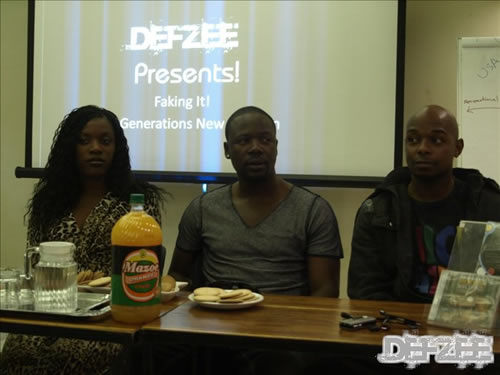Are Zimbabwean youths faking it or figuring it out?
It’s very often you hear people, especially the youth in Zimbabwe, speaking in what seems to be borrowed accents. A scenario that many people might have encountered is in public transport, say in a commuter omnibus, when a girl’s phone rings and she picks up an accent and everyone turns their heads to try and match the face with the accent. Also ladies who call into radio stations tend to speak in a borrowed accent, which the DJ finds it hard to hear what is exactly being said. So they try by all means to keep the conversation short.
A food for thought session facilitated by DefZee, an online youth group, at the U.S. Embassy’s Public Affairs Auditorium discussed the topic, “Faking it- this generation’s new religion”. The panel that shared their views on the issue included local musicians Stunner, Cindy and Ten Diamond. The musicians seemed to have different views but listening closely it seemed like they thought in a similar way.
The musicians were asked to respond to this whole faking it religion and whether they were faking it. Ten Diamond said that people have been faking it for ages and it was not something only to be associated with the youth of today. He admitted that the media has a great role to play in influencing the youth. Therefore in his view Zimbabwean youth are not faking because of the environment they are living in which is dominated by the western media. In his own right as an artist, he sings hip-hop, a music genre from America. However, he contextualises his lyrics to suit the Zimbabwean environment.
Stunner admitted that people are faking it 90%. He said that youths fake for a reason and in so doing some find themselves living different lives at home, on stage, with friends or at church. Personally Stunner maintains that he is not doing any faking because he is not trying to live anyone’s lifestyle but his own. For example in his hit song ‘Team Hombe’, he sings ‘andisi mhene zvangu asi ndiri bho‘ (I am not filthy rich but am cool). He explained that he doesn’t have much money to live the flamboyant lifestyle but with what he has it’s enough for him and he is cool with it.
Cindy, the only female artist on the panel and who had the opportunity to perform at this year’s Big Brother Amplified show, is hurt by those who fake it. To her the youth living in Zimbabwe are not faking as much as those Zimbabweans living in the diaspora. She gave an account of a number of her friends who are Zimbabwean and living in the diaspora but when asked of their nationality they claim to be Malawians or South Africans. She also discussed some of the diaspora which upon returning to Zimbabwe cannot speak Shona or Ndebele. To her, these people fake it by leaving and denying their roots. In her words, ‘faking it is denouncing who you are and embracing who you are not’. Cindy said she wrote a song, ‘Zimbo swag‘ to celebrate the style, intelligence and resources Zimbabwean youths have.
All the artists on this panel were asked why they use fake names or dress in certain ways on stage. Aren’t they faking it? They responded that they are in the music business to sell and therefore they dress to sell. They give themselves fake names for easy identification, and easy recall on the listener’s part. So the next time you see Rocqui on stage with his torn jeans and shabby hair he’s not faking, he is merely trying sell his music. You can be a salad, murasta, muninja but are you faking it?


